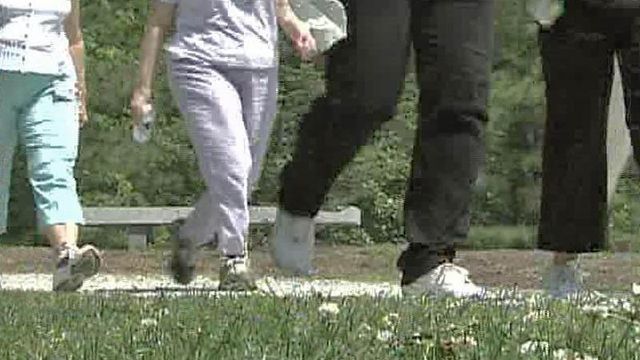Good Health Can Be a Walk in the Park
Many people put off getting into the habit of exercise because they think they would have to join a gym or it will take too much time. But studies show that a good start is taking a simple daily walk.
Posted — UpdatedDuke University Medical Center employees made sure they brought their walking shoes to work Wednesday for the American Heart Association's national "Start Walking at Work Day."
Tesca Kinard, a former Duke employee, came back for the special event.
"I exercise at home doing my basic low-cardio impact and just walking 30 minutes a day," Kinard said.
She got started on a fitness routine more than 10 years ago when she developed a heart condition after child birth called post-partum cardiomyopathy. High blood pressure weakened her heart muscle, so she uses exercise to make it stronger.
Studies show that brisk walking can help people live longer. Every hour of walking adds two hours of life expectancy. Thirty to 60 minutes of walking a day can build muscle, speed up metabolism to burn excess stored fat and help prevent heart disease.
Last week, Blue Cross Blue Shield of North Carolina workers in Chapel Hill walked as part of their own national walk at lunch day. Many said they have tried to develop the habit before, but they said having co-workers help hold her accountable is a key to success.
"There's always power in numbers, I guess, and when you have team members who are encouraging you and doing the same thing, it makes it that much easier," Blue Cross employee Kathy Norris said.
More employers promote regular exercise during the work day to stem the rising cost of health insurance in addition to creating a healthier, happier work force.
"What you're going to find, what the studies show, if they're active with their health, their costs of health care are going to go down," said David Markowitz of the American Heart Association.
Costs go down for the employers as well as the employees, Markowitz said.
A new Duke study confirms those cost issues. Researchers reviewed the health records of about 12,000 Duke workers over seven years and found obese workers filed twice the number of worker's compensation claims and had medical costs from the claims that were seven times higher.
Overweight workers also lost 13 times the number of days of work from injury or illness when compared with other workers, according to the Duke study.
• Credits
Copyright 2024 by Capitol Broadcasting Company. All rights reserved. This material may not be published, broadcast, rewritten or redistributed.





